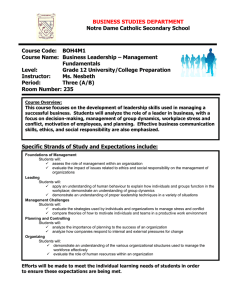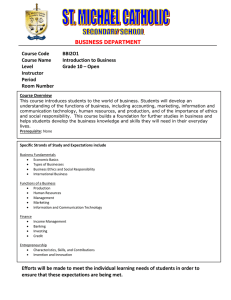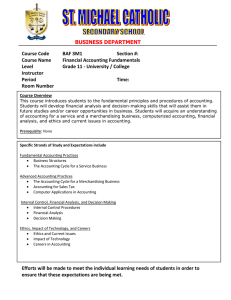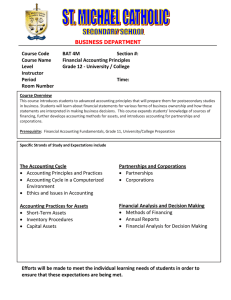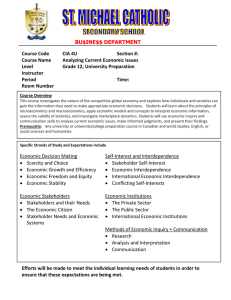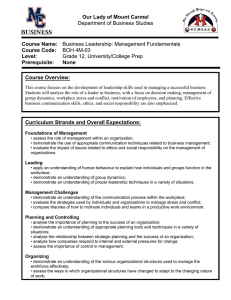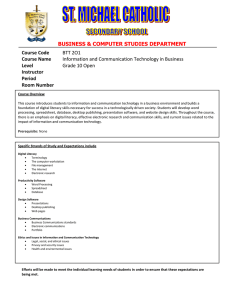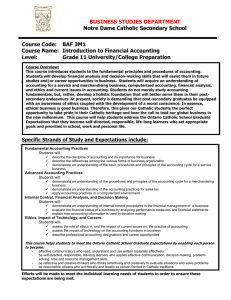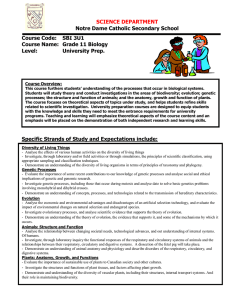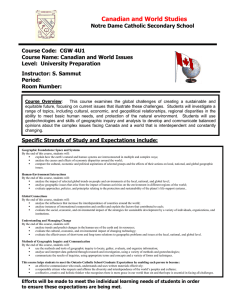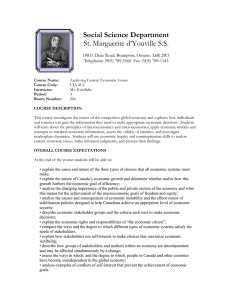Course Code BOH4M1 Course Name
advertisement
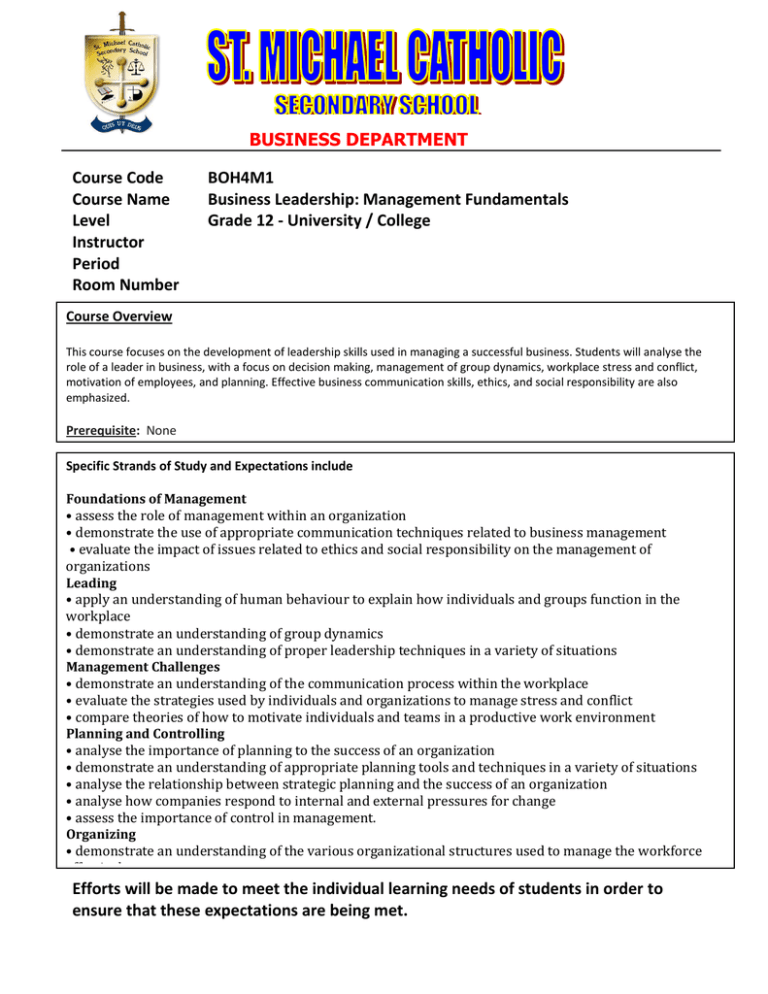
BUSINESS DEPARTMENT Course Code Course Name Level Instructor Period Room Number BOH4M1 Business Leadership: Management Fundamentals Grade 12 - University / College Course Overview This course focuses on the development of leadership skills used in managing a successful business. Students will analyse the role of a leader in business, with a focus on decision making, management of group dynamics, workplace stress and conflict, motivation of employees, and planning. Effective business communication skills, ethics, and social responsibility are also emphasized. Prerequisite: None Specific Strands of Study and Expectations include Foundations of Management • assess the role of management within an organization • demonstrate the use of appropriate communication techniques related to business management • evaluate the impact of issues related to ethics and social responsibility on the management of organizations Leading • apply an understanding of human behaviour to explain how individuals and groups function in the workplace • demonstrate an understanding of group dynamics • demonstrate an understanding of proper leadership techniques in a variety of situations Management Challenges • demonstrate an understanding of the communication process within the workplace • evaluate the strategies used by individuals and organizations to manage stress and conflict • compare theories of how to motivate individuals and teams in a productive work environment Planning and Controlling • analyse the importance of planning to the success of an organization • demonstrate an understanding of appropriate planning tools and techniques in a variety of situations • analyse the relationship between strategic planning and the success of an organization • analyse how companies respond to internal and external pressures for change • assess the importance of control in management. Organizing • demonstrate an understanding of the various organizational structures used to manage the workforce effectively •Efforts assess the ways whichtoorganizational structures learning have changed to adapt to the changing nature will be in made meet the individual needs of students in order to of work • evaluate the role of human resources within an organization ensure that these expectations are being met. Course Breakdown Unit 1: Foundations of and Controlling Management - Management Fundamentals - Business Communication - Ethics and Social Responsibility Unit 2: Leading - Human Behaviour - Group Dynamics - Leadership Techniques Unit 3: Management Challenges Unit 4: Planning - The Importance of planning - Planning tools & techniques - Strategic Planning - Management of Change - Controlling Unit 5: Organizing - Organizational Structures - Changing Nature of Work - Human Resources - The Communication Process - Motivation - Stress & Conflict Management Resources The course will use a variety of resources including SMARTBOARD technology, video, Internet Applications and business software. The student textbook Management Fundamentals: Canadian Edition will be distributed to students during the first week of the course. Any damage incurred or lost textbook will result in a replacement payment of ($80.00). Evaluation Structure Knowledge/Understanding 30% Thinking/Inquiry 25 % Application 25% Communication 20% The above is reflected in the term work (worth 70% of the final mark) and the summative work (worth 30% of the final mark). Summative work consists of the Final Exam (30%). Evaluation Policy: Students will be assessed & evaluated according to the work produced & skills displayed. Methods of providing feedback will include assessing work in process & evaluating completed assignments, tests, co-operative learning activities, simulations and presentations. Peer & self-evaluations will also be utilized. Student marks will be determined by evaluating process & product according to 4 categories & 4 levels. Please see the chart below for specific skills and key words used to determine student competency in the different categories. Level Level 1: Level 2: Level 3: Level 4: Category 50-59% 60-69% 70-79% 80-100% Knowledge/Understanding -Limited -Some success -Considerable -Thorough display of in displaying display of understanding of Knowledge of facts & terms knowledge, knowledge, knowledge skills concepts and ability Understanding of concepts & relationships skills and skills and and ability to apply to communicate, Thinking/Inquiry ability to apply application of concepts think creatively and Critical thinking skills concepts concepts apply concepts Creative thinking skills Inquiry Skills Communication Communication of ideas and information Use of symbols & visuals Oral & written communication Application Applications in familiar contexts Transfer of concepts to new contexts Making logical conclusions and predictions Use of technology Making connections Feedback will also be provided for student learning skills. Skills like responsibility, organization, independent, work, collaboration, initiative and self-regulation are assessed independently. Student achievement and will be conducted through the use of a rubric indicating specific criteria to be achieved to receive each of the following letter grades: E –Excellent G – Good S – Satisfactory N - Needs Improvement Other Evaluation Issues LATE ASSIGNMENTS. Assignments submitted after the Primary Due Date established by the teacher will be accepted with a penalty of 5% off for the first day late and 2% for subsequent days to a maximum of 10%. This four day Penalty Zone is the maximum time allowed for submissions. The fourth day after the assignment is due is considered the Closure Date upon which no further assignments will be accepted. If the teacher returns the marked assignments within the four day penalty zone, the date of return is considered the closure date. Repeated lateness in submissions indicates poor organization skills and will result in parental contact and will be reflected in the learning skills section of the report card. INCOMPLETE ASSSIGNMENTS Assignments will be graded according to the extent with which they meet the criteria established in the rubric or evaluation structure. MISSED TESTS Tests missed with a legitimate reason will be written within a few days of the student returning from the absence. Student eligibility to write the test and the date of writing will be at the discretion of the teacher in consultation with the department head. CULMINATING ACTIVITIES Consists of a final exam = 30% of final mark. See Category Weightings and Final 30% Values UPDATE Program Department REVISED June, 2011, DPCDSB Plagiarism in any form reflects academic dishonesty and will result in a mark of zero for the assignment in question.
